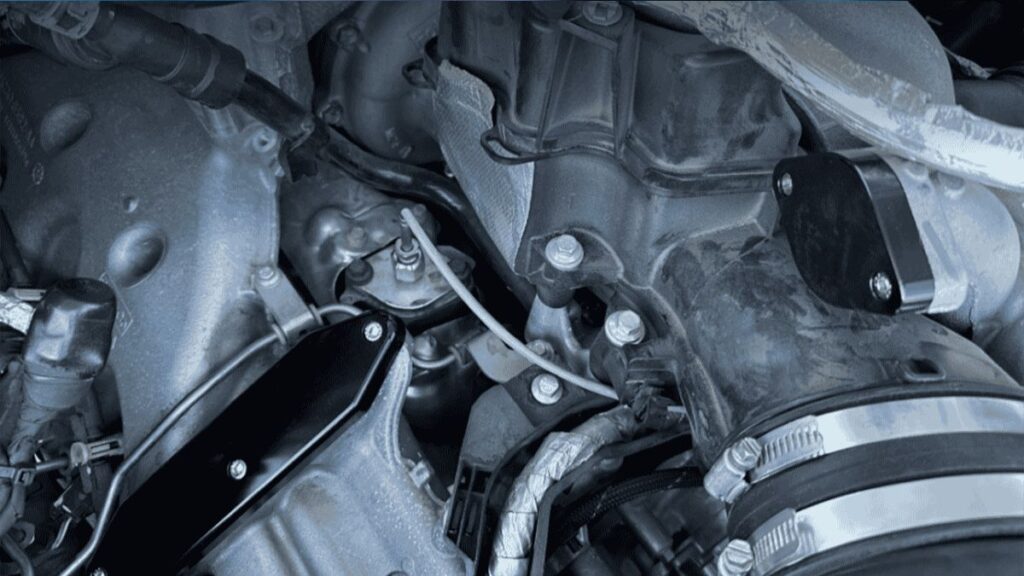The Exhaust Gas Recirculation (EGR) system in diesel engines helps cut down harmful pollution by sending some exhaust back into the engine. This cools things down and reduces emissions. Some people remove the EGR to make their vehicle run better or save on repairs. But a big worry is: does taking out the EGR cause black smoke? Black smoke means the engine isn’t burning fuel properly, which can cause problems.
In this post, we’ll explain what the EGR does, why people delete it, what black smoke means, and if an EGR delete leads to it. We’ll also share tips to avoid smoke and what to think about before making changes.
What is the EGR System?
The EGR system helps diesel engines run cleaner. The EGR system takes some of the exhaust gases and sends them back into the engine to lower emissions. This can create carbon buildup and reduce power over time. An EGR delete kit removes or blocks this system and often includes metal plates, gaskets, and software to update your vehicle’s computer. By getting rid of the EGR system, your engine can breathe better and run more smoothly. At Spetuner, they offer high-quality EGR delete kits designed to help improve engine performance and reduce common issues like power loss or rough idling.
Main Parts of the EGR System:
- EGR Valve – Controls the flow of exhaust gases.
- EGR Cooler – Lowers the temperature of exhaust before it goes back into the engine.
- Sensors – Help monitor how the system is working.
Over time, these parts can get dirty with soot and carbon, which makes the system work poorly. This can lower your engine’s power or fuel economy and even cause problems like stalling or engine warning lights. That’s why some drivers choose to remove it—but that decision comes with pros and cons.
Why Do People Delete the EGR?
Many diesel truck and car owners delete the EGR system for performance and maintenance reasons. Here’s why:
- Better Fuel Efficiency – Without the EGR restricting airflow, your engine doesn’t have to work as hard, which can mean fewer stops at the pump.
- Longer Engine Life – Less carbon buildup = fewer problems down the road. Your engine stays cleaner and runs stronger for years.
- More Power and Torque: It is great for towing or hauling heavy loads to delete the EGR because it can unlock extra horsepower.
- Cleaner Engine Components: It will give you peace of minf as you’ll deal with fewer clogs and less soot inside your engine.
- Lower Maintenance Costs: With fewer EGR-related repairs, you can save money in the long run.
But deleting the EGR can also bring problems:
- It’s illegal in many places because it increases emissions.
- It can void your warranty.
- If not installed or tuned properly, it can cause black smoke or engine damage.
Some buyers may avoid a vehicle with deleted emissions equipment. So it can lower resell value.
Understanding Black Smoke in Diesel Engines
Black smoke happens when the engine doesn’t burn fuel properly. This usually means there’s too much fuel or not enough air. It’s a sign that the engine is struggling with combustion.
Different Types of Exhaust Smoke:
- Black Smoke – Too much fuel or poor air mix.
- White Smoke – Unburned fuel or coolant leak.
- Blue Smoke – Burning oil.
A little black smoke during hard acceleration is normal. But thick, constant black smoke is a sign something is wrong—like a clogged air filter, worn fuel injectors, or bad tuning. It also makes your engine dirtier and pollutes more.
Will EGR Delete Cause Black Smoke?
- No – If Done Properly
- Not every EGR delete leads to black smoke. If done the right way, you might not see any smoke at all. Here’s how:
- Professional ECU Remap – A good tuner adjusts fuel and air properly to avoid smoke.
- Upgraded Parts – Better fuel injectors and sensors help the engine burn fuel more cleanly.
- Regular Maintenance – Cleaning the intake manifold and checking the turbo system helps prevent smoke.
With the right tuning and care, an EGR delete doesn’t have to cause black smoke.
- Yes – In Some Cases
- Removing the EGR can cause black smoke if it’s not done right. Here’s why:
- Hotter Engine Temperatures – No EGR means hotter combustion, which can lead to more soot and black smoke.
- Poor Tuning – If the ECU (engine control unit) isn’t adjusted properly, the engine might burn too much fuel.
- No Cooling or Exhaust Mix – The EGR helps cool and dilute the exhaust. Without it, more soot is created.
So yes, an EGR delete can cause black smoke—especially if the job isn’t done professionally.
How to Prevent Black Smoke After EGR Delete
Follow these steps to keep your engine clean:
- Get a Quality ECU Remap – A remap tells the engine how to adjust fuel and air without the EGR.
- Clean Your Intake System – Soot builds up in the intake and intercooler. Cleaning them improves airflow.
- Check Turbo and Injectors – Always check bad injectors because it can cause poor combustion.
- Install a Catch Can. It’ll captures and filters excess oil from entering the engine’s intake manifold.
- It’s highly recommended to use clean diesel because it burns better and creates less smoke.
These actions can reduce or even stop black smoke after an EGR delete.
Is Black Smoke Harmful?
Yes, black smoke is bad for both your engine and the environment. Here’s how:
- Environmental Damage – Black smoke releases dirty particles into the air, which can cause breathing problems and air pollution.
- Engine Wear – Soot clogs your diesel particulate filter (DPF) and dirties sensors, which can lead to expensive repairs.
- Legal Trouble – In many places, cars that produce black smoke fail emissions tests or inspections. This can lead to fines or registration problems.
A little black smoke might not seem serious, but letting it go unchecked can cost you in the long run.
Conclusion
Deleting the EGR delete cause system can improve performance and reduce maintenance for your diesel engine, but it’s not without risk. One big issue is black smoke, which often happens if the delete isn’t done right. Poor tuning, dirty intake parts, or bad fuel injectors all make it worse.
Most of the performance issues come when you don’t do the vehicle’s proper engine tuning and routine maintenance. If you keep the engine in good condition, then it extends its lifespan and can reduce or avoid black smoke. So always take care of the routine maintenance to save yourself from a headache. These deletes are great for drivers focused on racing, towing, or off-roading.
FAQs
Does black smoke always mean something is wrong?
Not always. A small puff under heavy load is normal, but thick or constant smoke is a sign of a problem.
Can EGR delete damage my engine?
Yes, if it’s not tuned properly. High temps and bad combustion can hurt engine parts.
Will EGR delete improve fuel economy?
Sometimes, with proper tuning. Without tuning, it may hurt mileage instead of helping.
Is EGR delete legal?
In many places, no. It breaks emissions laws and could fail inspection.
Can I delete the EGR myself?
You if you understand everything about engine tuning and systems.







